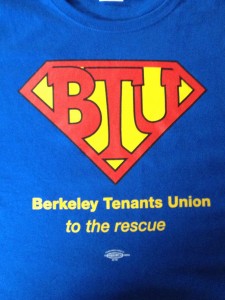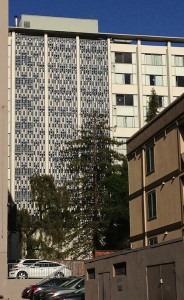BTU Members Meeting
 Berkeley Tenants Union will hold our quarterly member potluck on Wednesday July 8th. There will be free tenant counseling from 6:30 to 7:30 PM, updates on demolitions and short term rentals regulations, and a roundtable discussion about enforcement of safety and habitability concerns for tenants.
Berkeley Tenants Union will hold our quarterly member potluck on Wednesday July 8th. There will be free tenant counseling from 6:30 to 7:30 PM, updates on demolitions and short term rentals regulations, and a roundtable discussion about enforcement of safety and habitability concerns for tenants.
Demolition Decision Sets Bad Precedents
Learn more about what happened at the Zoning Board at our quarterly member potluck on July 8th.
ZAB Grants Demolition…
“Some speakers at the meeting were concerned that the owner of the building deliberately worsened its condition in order to get approval for its demolition. John Selawsky, a substitute for Sophie Hahn and the only ZAB member to vote no on the use permit, said the building showed signs of deliberate neglect. Cliff Orloff, managing partner of developer OPHCA LLC, agreed to let the Berkeley Fire Department conduct training exercises in the building in 2014.”
http://www.dailycal.org/2015/06/26/zoning-adjustments-board-approves-student-housing-complex-on-durant-avenue/
…Despite Strong Public Protest
“Earlier this week, in an email regarding the project, a UC Berkeley student who said she used to live at 2631 Durant said tenants had been required by the owner to move out by a certain date, and that conditions had been poor.“When I was signing my lease I was told that I was signing under the condition that I would move out on May 31, 2014. We were told that the building was going to be torn down and developed,” wrote Nicole Yeghiazarian.
“The building was kept in awful shape because they did not want us to stay. When I moved into my apartment, there was mold. The kitchen was filthy with food stains around the stove.… Other tenants I talked to had similar complaints of conditions inside and outside of their units being dilapidated. It really felt like they were doing the bare minimum to not be sued, but wanted to make our conditions unpleasant enough that we would move out.” Added local resident Tree Fitzpatrick, in an email to the zoning board, “To grant this project as requested is to condone demolition by neglect.”
http://www.berkeleyside.com/2015/06/25/berkeley-zoning-board-to-consider-demolition-on-durant/
Short Term Rentals
We have heard that legal service providers like the East Bay Community Law Center are seeing more attempted evictions for renters who sublet for the short term on services like Airbnb. Currently, the Berkeley proposal to legalize such rentals may allow renters to sublet this way as long as the place is their home. But that doesn’t mean doing so won’t be a violation of their lease – it depends on the agreement. Renters should read the fine print, and remember the Rent Ordinance prohibits charging more than a prorated portion of the controlled rent.
Below is the document some folks currently violating Berkeley’s ban on such rentals are presenting to the Planning Commission, who will hold a hearing soon regarding the potential new laws and taxes in Berkeley.
We have just a few corrections: Regulations are not “being passed” – the current prohibition is being lifted for some users. Therefore, the number of short term rentals will not be “cut,” and no law-abiding citizens will see their “livelihood” impacted. These new regulations will not reduce any legal income, they will only legalize a currently illegal activity for some but not all users. It’s like saying the pot dealer on the corner is going to be put out of business by the legalization of medical marijuana!
2015-07-01_Communications_Berkeley Home Sharers_Recommendation on Revisions
Landlords Favor Allowing Hotels Anywhere, Unless Run By A Renter
“Sid Lakireddy, president of the Berkeley Property Owners Association, said he doesn’t think the use of Airbnb among tenants is widespread. Lakireddy believes that property owners should be allowed to use Airbnb, but not tenants.
“It’s a lot of work for a property owner to do Airbnb, and if they feel like they can make more doing it, I don’t think we should stop them,” he said. “If a tenant is doing it, that’s wrong because they’re using somebody else’s property to make a profit.”
http://www.dailycal.org/2015/06/21/city-considers-lifting-restrictions-on-short-term-rentals-while-practice-abounds/
Council Passes Referral Designed to Protect Rental Housing Stock
“The proposal, introduced by Mayor Tom Bates and Councilmember Lori Droste, would legalize rentals not exceeding 14 consecutive days and would tax hosts in the same way as hotels. Under the proposed regulations, the property must be occupied by the owner or tenant for at least nine months of the year and can be rented out no more than 90 days if the host is not present.”
http://www.dailycal.org/2015/06/25/city-council-refers-short-term-rentals-proposal-planning-housing-advisory-commissions/
San Francisco Hires 6 to Crack Down on Illegal Hotels
http://www.bizjournals.com/sanfrancisco/morning_call/2015/07/san-francisco-airbnb-law-enforcement-office-hosts.html
Paris Neighborhood Had More Airbnb Guests Than Actual Residents
“During summer 2014, 66,320 people stayed on Airbnb in the neighborhood’s two arrondissements, slightly more than the 64,795 who actually live in them, according to 2012 figures. The popularity of tourist rentals also made it a target of French housing inspectors. In May, inspectors made surprise early-morning inspections that turned up roughly 100 potentially illegal apartments.”
http://graphics.wsj.com/how-airbnb-is-taking-over-paris/
Balcony Collapse Highlights Problems with Code Enforcement
Code enforcement complaints and missing inspection forms at Library Gardens highlight the need to revamp Berkeley’s Rental Housing Safety Program. Currently, the program is a little meaningless. Landlords have to pay a fee and do inspections each year, but they don’t have to turn in the forms to the City. Issues about inspections and habitability will be the topic of a BTU member roundtable at our quarterly meeting on July 8th.
Missing Inspection Forms at Library Gardens
“Prior to July 1st, city officials say Greystar provided the wrong inspection records, failing to use the form required by the city. In a letter to Greystar, the city noted that the self-inspections were also missing required signatures and dates.”
http://wn.ktvu.com/story/29458314/2-investigates-missing-incomplete-safety-inspections-after-berkeley-balcony-collapse
Mayor Says New Housing Is Safe
“Berkeley code enforcement inspectors might not have been previously aware of Library Gardens’ failure to perform safety inspections. Those records are not required to be filed with the city unless a code inspector asks for them. Bates said it was unreasonable to mandate increased city inspection of rentals, given the city’s budget, but believed newer apartment buildings are not apt to present many hazards”.
http://www.latimes.com/local/lanow/la-me-ln-balcony-inspection-report-20150629-story.html
Balcony Collapse Spotlights Dry Rot
Yes, but when will they realize we need to inspect more than just balconies?
“In Berkeley, officials recognized this gap in oversight and a week after the balcony disaster called for a mandate on building owners to inspect balcony supports at least once every five years. State officials are considering whether the balcony collapse demands a broader fix.”
http://www.latimes.com/local/california/la-me-balcony-dry-rot-20150626-story.html
Criminal Investigation
“As reported by the San Francisco Chronicle, the investigation will likely focus on Segue Construction Inc. — the company responsible for constructing the building — and on R. Brothers Inc., the company responsible for waterproofing the balcony’s wooden support beams. Several lawsuits throughout the Bay Area involving allegations of water penetration due to faulty waterproofing have been filed against Segue in the past.”
http://www.dailycal.org/2015/06/25/alameda-county-lead-criminal-investigation-berkeley-balcony-collapse/
From Other BTU Members:
Supreme Court on Fair Housing
From a BTU Member: I think that the Court’s decision on the Fair Housing Act is more important, insofar as it established the “disparate treatment” standard. This is a significant victory for tenants and housing rights advocates. It will now be much harder to defend discrimination and segregation in housing and other areas on the basis that it was not intentional.
http://feminist.org/blog/index.php/2015/06/25/the-supreme-court-fair-housing-ruling-is-a-civil-rights-victory/
And In Other News:
Demolitions, Ellis Act Plague Los Angeles Renters
http://www.latimes.com/opinion/op-ed/la-oe-0609-gross-housing-ellis-act-20150609-story.html
Cal Student Plagued by Pests
http://www.dailycal.org/2015/06/10/off-the-beat-on-renting-and-raccoons/

